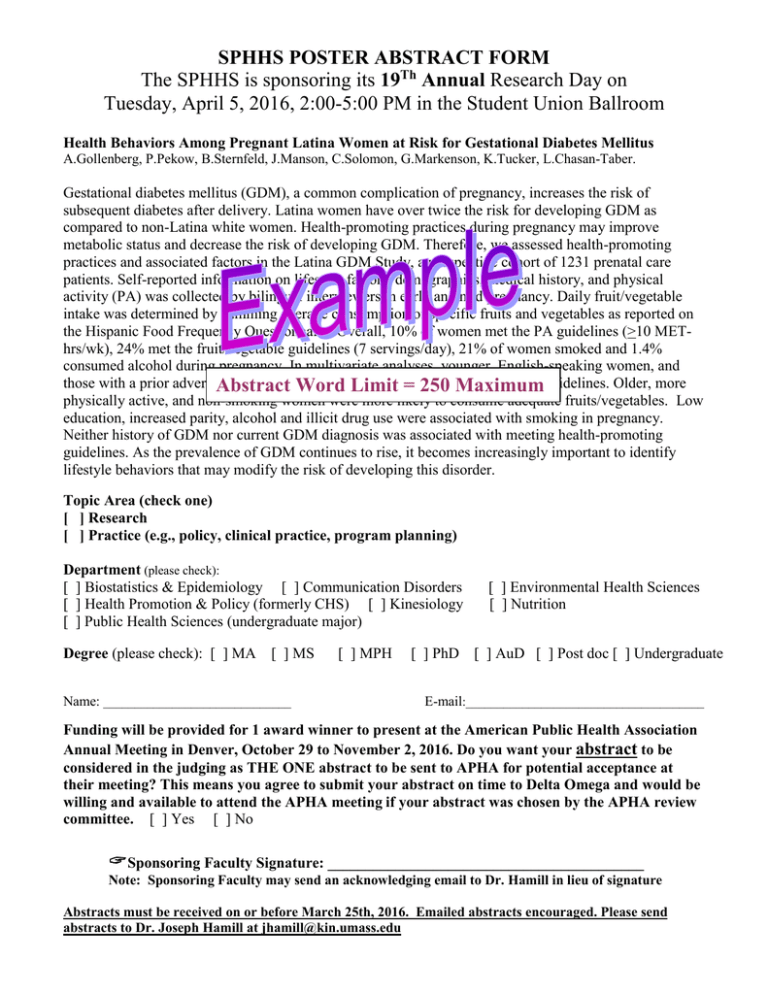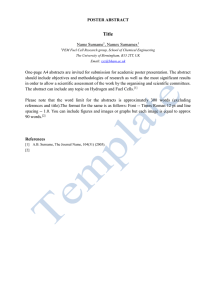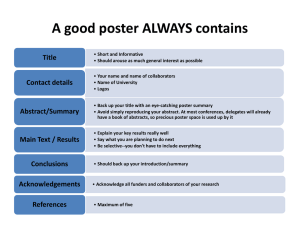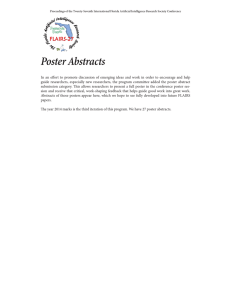SPHHS POSTER ABSTRACT FORM Annual 19
advertisement

SPHHS POSTER ABSTRACT FORM The SPHHS is sponsoring its 19Th Annual Research Day on Tuesday, April 5, 2016, 2:00-5:00 PM in the Student Union Ballroom Health Behaviors Among Pregnant Latina Women at Risk for Gestational Diabetes Mellitus A.Gollenberg, P.Pekow, B.Sternfeld, J.Manson, C.Solomon, G.Markenson, K.Tucker, L.Chasan-Taber. Gestational diabetes mellitus (GDM), a common complication of pregnancy, increases the risk of subsequent diabetes after delivery. Latina women have over twice the risk for developing GDM as compared to non-Latina white women. Health-promoting practices during pregnancy may improve metabolic status and decrease the risk of developing GDM. Therefore, we assessed health-promoting practices and associated factors in the Latina GDM Study, a prospective cohort of 1231 prenatal care patients. Self-reported information on lifestyle factors, demographics, medical history, and physical activity (PA) was collected by bilingual interviewers in early and mid pregnancy. Daily fruit/vegetable intake was determined by summing average consumption of specific fruits and vegetables as reported on the Hispanic Food Frequency Questionnaire. Overall, 10% of women met the PA guidelines (>10 METhrs/wk), 24% met the fruit/vegetable guidelines (7 servings/day), 21% of women smoked and 1.4% consumed alcohol during pregnancy. In multivariate analyses, younger, English-speaking women, and those with a prior adverseAbstract pregnancy outcome more=likely meet the PA guidelines. Older, more Wordwere Limit 250toMaximum physically active, and non-smoking women were more likely to consume adequate fruits/vegetables. Low education, increased parity, alcohol and illicit drug use were associated with smoking in pregnancy. Neither history of GDM nor current GDM diagnosis was associated with meeting health-promoting guidelines. As the prevalence of GDM continues to rise, it becomes increasingly important to identify lifestyle behaviors that may modify the risk of developing this disorder. Topic Area (check one) [ ] Research [ ] Practice (e.g., policy, clinical practice, program planning) Department (please check): [ ] Biostatistics & Epidemiology [ ] Communication Disorders [ ] Health Promotion & Policy (formerly CHS) [ ] Kinesiology [ ] Public Health Sciences (undergraduate major) Degree (please check): [ ] MA [ ] MS Name: ______________________________ [ ] MPH [ ] Environmental Health Sciences [ ] Nutrition [ ] PhD [ ] AuD [ ] Post doc [ ] Undergraduate E-mail:______________________________________ Funding will be provided for 1 award winner to present at the American Public Health Association Annual Meeting in Denver, October 29 to November 2, 2016. Do you want your abstract to be considered in the judging as THE ONE abstract to be sent to APHA for potential acceptance at their meeting? This means you agree to submit your abstract on time to Delta Omega and would be willing and available to attend the APHA meeting if your abstract was chosen by the APHA review committee. [ ] Yes [ ] No Sponsoring Faculty Signature: __________________________________________ Note: Sponsoring Faculty may send an acknowledging email to Dr. Hamill in lieu of signature Abstracts must be received on or before March 25th, 2016. Emailed abstracts encouraged. Please send abstracts to Dr. Joseph Hamill at jhamill@kin.umass.edu Schedule for the Day Set up time is from 1:00pm – 2:00 PM in the Ballroom of the Student Union Center. Poster boards and push pins will be supplied. You will need to be present during the poster viewing and judging from 2:00-4:00 PM. Design Instructions Present your information so a coherent and straight-forward story is told. Emphasize the most important points and avoid overwhelming the viewer with too much detail. Specific recommendations include: In the introduction - briefly summarize the necessary background that led to this work, clearly identify the purpose or specific aims of the study, and identify the questions asked or hypothesis(es) tested. If your poster is in the “practice” category, please describe the theoretical basis for the intervention or policy. Provide sufficient detail about methodology used to conduct the study, including number and necessary demographics of the participants studied. If your poster is in the “practice” category, provide supporting evidence for the approach or policy and the goals and objectives to be achieved. Results can be effectively presented by tables, figures, quotes, illustrations and/or photographs. For each table, figure, etc., a clear legend will go a long way in highlighting and briefly discussing the essential points. For program plans, please provide a clear logic model. Summary and conclusion - briefly, what are the "bottom lines" of your work and its significance in your field? Acknowledgment - identify funding source(s), institutional support, individuals who have contributed significantly but who are not listed as authors. Please note: you may present preliminary data. Printing of posters Page Setup: landscape at 56 in width x 36 in height. Posters should be set up using the SPHHS Power Point template at: http://www.umass.edu/sphhs/current-students/student-resources/studentresearch. Do not use any background colors, please leave as white. There will be no in-house poster printing. Please make use of poster printing services here on campus: http://www.library.umass.edu/services/learning-commons-technology-resources/posterprinting/. Be sure to plan ahead. Appointments are limited. Judging Criteria This year’s Research Day judging will again follow the format put into effect in 2011. FOR THE DELTA OMEGA AWARD School-wide judging will be on student ABSTRACTS only. Judging for Research Day awards (3 for Research and at least 2 for Practice) will be a combination of scores for abstracts, posters and presentations based on the qualities below. The poster is a display of a project in which you have actively participated. ALL POSTERS will be judged unless a student specifically requests to be exempted. Quality in Writing of Abstract Importance and Originality Methods Supporting Data/Philosophy/Theory Discussion/Conclusions Quality of Visual Presentation Clear and easy to read Graphs and figures easy to follow Quality of Oral Presentation Importance and Originality Methods Supporting Data/Philosophy/Theory Discussion/Conclusions Study Implications


